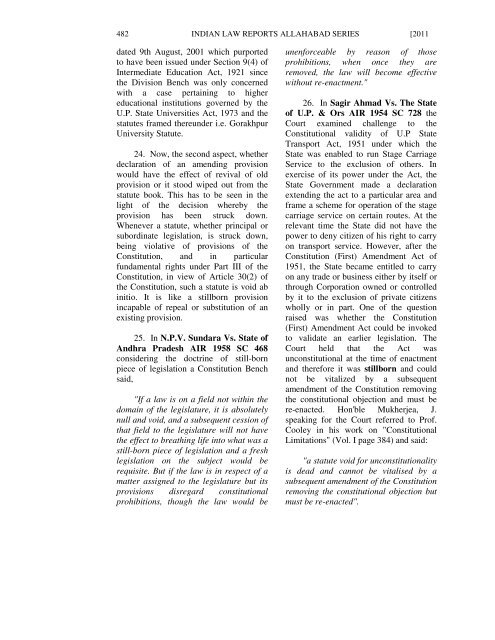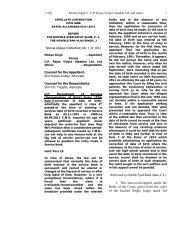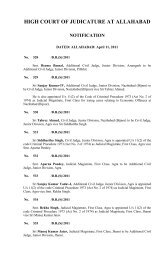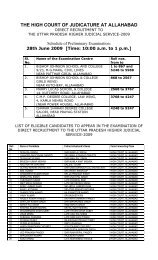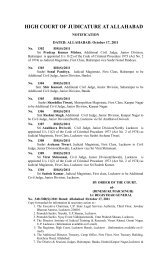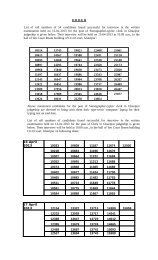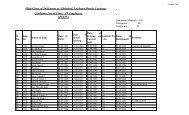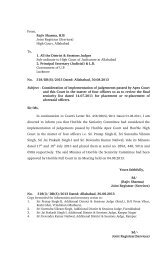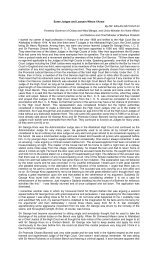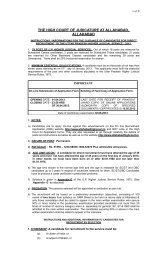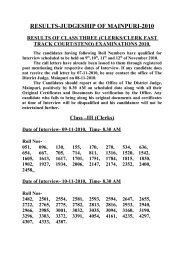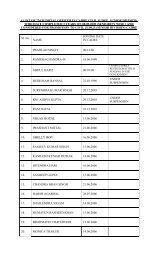Apr - High Court of Judicature at Allahabad
Apr - High Court of Judicature at Allahabad
Apr - High Court of Judicature at Allahabad
Create successful ePaper yourself
Turn your PDF publications into a flip-book with our unique Google optimized e-Paper software.
482 INDIAN LAW REPORTS ALLAHABAD SERIES [2011<br />
d<strong>at</strong>ed 9th August, 2001 which purported<br />
to have been issued under Section 9(4) <strong>of</strong><br />
Intermedi<strong>at</strong>e Educ<strong>at</strong>ion Act, 1921 since<br />
the Division Bench was only concerned<br />
with a case pertaining to higher<br />
educ<strong>at</strong>ional institutions governed by the<br />
U.P. St<strong>at</strong>e Universities Act, 1973 and the<br />
st<strong>at</strong>utes framed thereunder i.e. Gorakhpur<br />
University St<strong>at</strong>ute.<br />
24. Now, the second aspect, whether<br />
declar<strong>at</strong>ion <strong>of</strong> an amending provision<br />
would have the effect <strong>of</strong> revival <strong>of</strong> old<br />
provision or it stood wiped out from the<br />
st<strong>at</strong>ute book. This has to be seen in the<br />
light <strong>of</strong> the decision whereby the<br />
provision has been struck down.<br />
Whenever a st<strong>at</strong>ute, whether principal or<br />
subordin<strong>at</strong>e legisl<strong>at</strong>ion, is struck down,<br />
being viol<strong>at</strong>ive <strong>of</strong> provisions <strong>of</strong> the<br />
Constitution, and in particular<br />
fundamental rights under Part III <strong>of</strong> the<br />
Constitution, in view <strong>of</strong> Article 30(2) <strong>of</strong><br />
the Constitution, such a st<strong>at</strong>ute is void ab<br />
initio. It is like a stillborn provision<br />
incapable <strong>of</strong> repeal or substitution <strong>of</strong> an<br />
existing provision.<br />
25. In N.P.V. Sundara Vs. St<strong>at</strong>e <strong>of</strong><br />
Andhra Pradesh AIR 1958 SC 468<br />
considering the doctrine <strong>of</strong> still-born<br />
piece <strong>of</strong> legisl<strong>at</strong>ion a Constitution Bench<br />
said,<br />
"If a law is on a field not within the<br />
domain <strong>of</strong> the legisl<strong>at</strong>ure, it is absolutely<br />
null and void, and a subsequent cession <strong>of</strong><br />
th<strong>at</strong> field to the legisl<strong>at</strong>ure will not have<br />
the effect to bre<strong>at</strong>hing life into wh<strong>at</strong> was a<br />
still-born piece <strong>of</strong> legisl<strong>at</strong>ion and a fresh<br />
legisl<strong>at</strong>ion on the subject would be<br />
requisite. But if the law is in respect <strong>of</strong> a<br />
m<strong>at</strong>ter assigned to the legisl<strong>at</strong>ure but its<br />
provisions disregard constitutional<br />
prohibitions, though the law would be<br />
unenforceable by reason <strong>of</strong> those<br />
prohibitions, when once they are<br />
removed, the law will become effective<br />
without re-enactment."<br />
26. In Sagir Ahmad Vs. The St<strong>at</strong>e<br />
<strong>of</strong> U.P. & Ors AIR 1954 SC 728 the<br />
<strong>Court</strong> examined challenge to the<br />
Constitutional validity <strong>of</strong> U.P St<strong>at</strong>e<br />
Transport Act, 1951 under which the<br />
St<strong>at</strong>e was enabled to run Stage Carriage<br />
Service to the exclusion <strong>of</strong> others. In<br />
exercise <strong>of</strong> its power under the Act, the<br />
St<strong>at</strong>e Government made a declar<strong>at</strong>ion<br />
extending the act to a particular area and<br />
frame a scheme for oper<strong>at</strong>ion <strong>of</strong> the stage<br />
carriage service on certain routes. At the<br />
relevant time the St<strong>at</strong>e did not have the<br />
power to deny citizen <strong>of</strong> his right to carry<br />
on transport service. However, after the<br />
Constitution (First) Amendment Act <strong>of</strong><br />
1951, the St<strong>at</strong>e became entitled to carry<br />
on any trade or business either by itself or<br />
through Corpor<strong>at</strong>ion owned or controlled<br />
by it to the exclusion <strong>of</strong> priv<strong>at</strong>e citizens<br />
wholly or in part. One <strong>of</strong> the question<br />
raised was whether the Constitution<br />
(First) Amendment Act could be invoked<br />
to valid<strong>at</strong>e an earlier legisl<strong>at</strong>ion. The<br />
<strong>Court</strong> held th<strong>at</strong> the Act was<br />
unconstitutional <strong>at</strong> the time <strong>of</strong> enactment<br />
and therefore it was stillborn and could<br />
not be vitalized by a subsequent<br />
amendment <strong>of</strong> the Constitution removing<br />
the constitutional objection and must be<br />
re-enacted. Hon'ble Mukherjea, J.<br />
speaking for the <strong>Court</strong> referred to Pr<strong>of</strong>.<br />
Cooley in his work on "Constitutional<br />
Limit<strong>at</strong>ions" (Vol. I page 384) and said:<br />
"a st<strong>at</strong>ute void for unconstitutionality<br />
is dead and cannot be vitalised by a<br />
subsequent amendment <strong>of</strong> the Constitution<br />
removing the constitutional objection but<br />
must be re-enacted".


